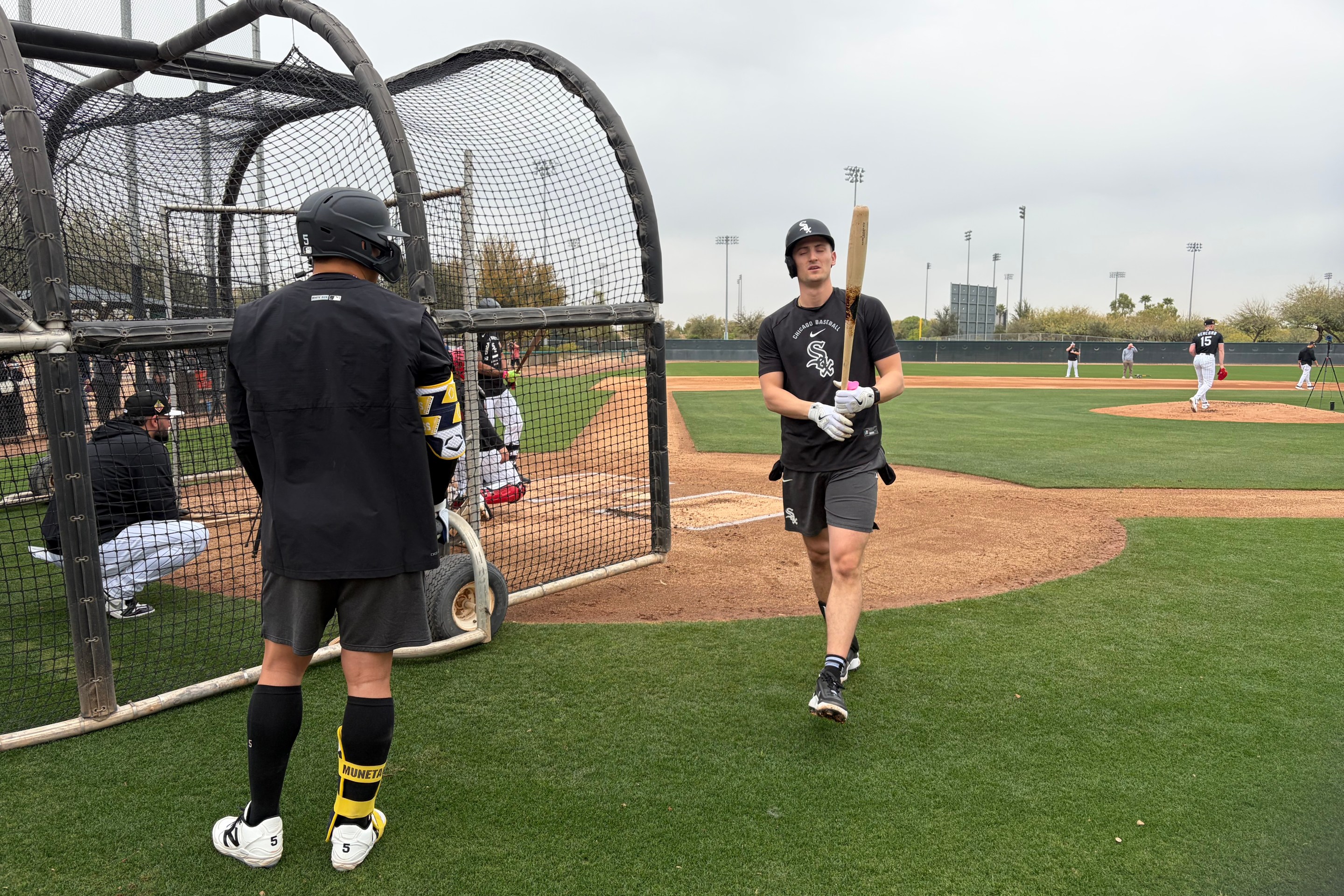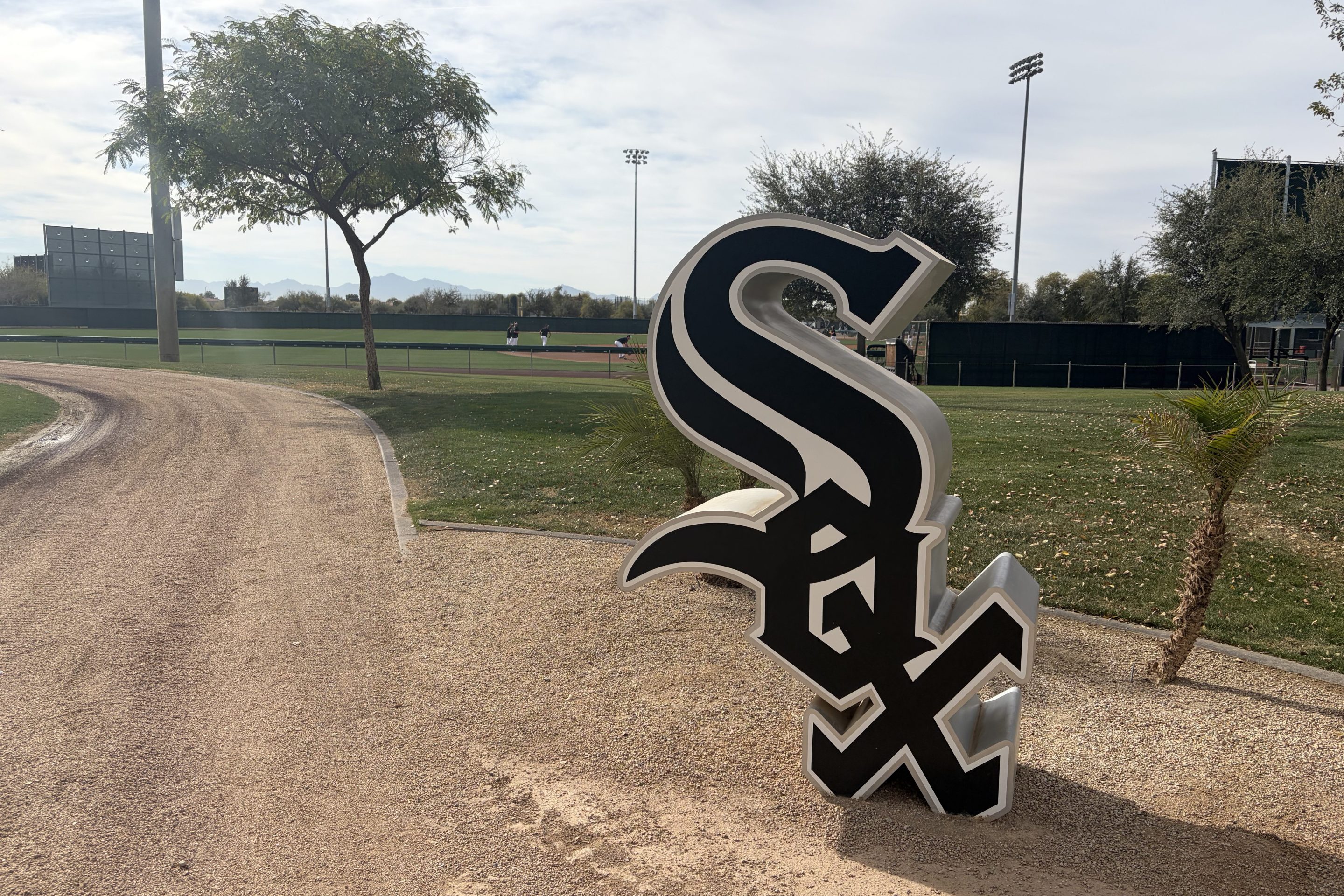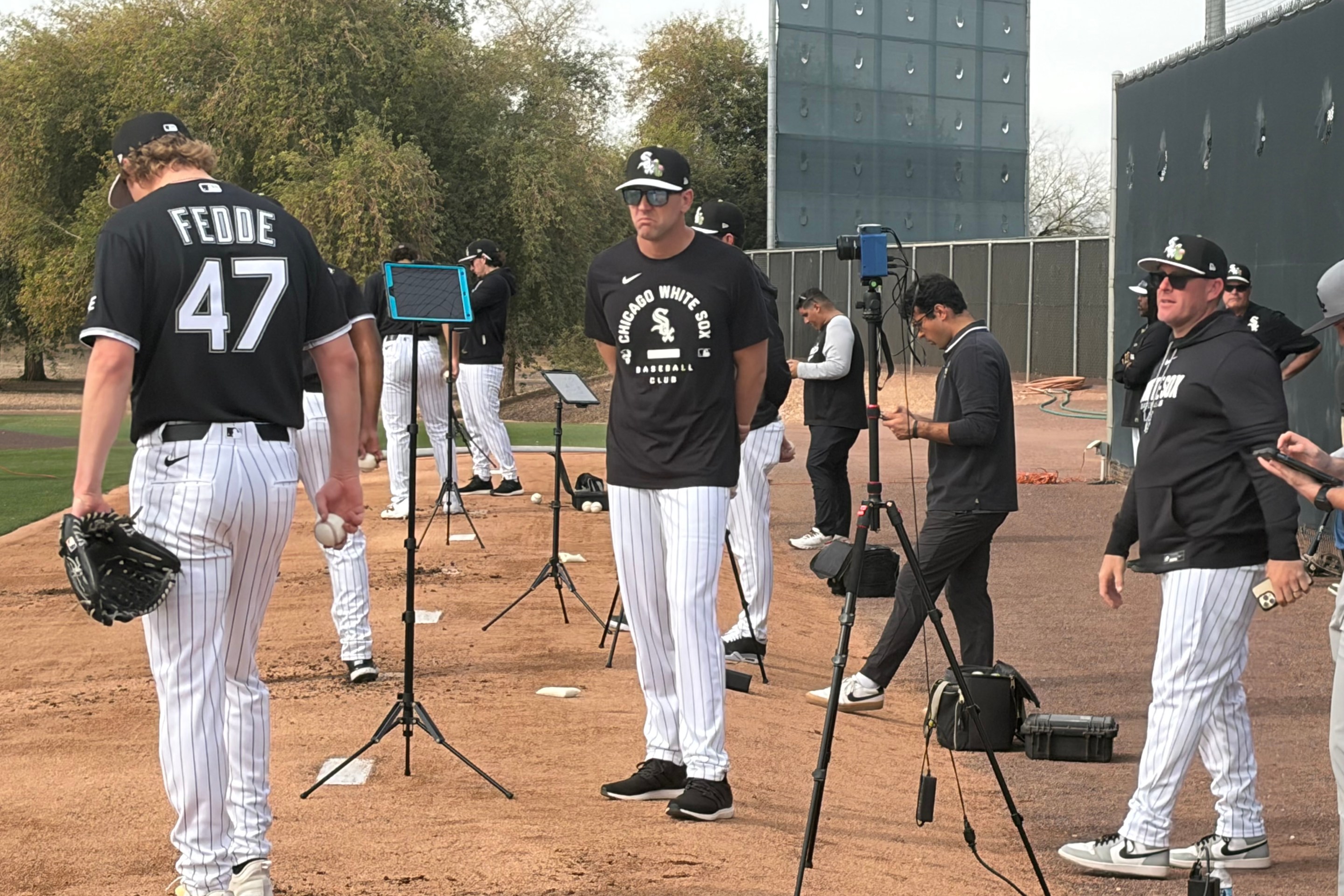[dropcap]T[/dropcap]here are times, particularly of late, when it feels as though the White Sox don't score much, if at all. For instance, the Sox currently score just about 4 runs per game, while the league average is right around 4.40. In 2003, the league average was (as you might expect) higher at 4.73. Overall, the '03 White Sox checked in above that, scoring on average 4.88 runs per game. In the early going of the 2003 season, however, the offense struggled quite a bit. Going into this game the Sox had averaged 3 runs/game over their last 21 which led to much hand-wringing and angst among those who followed the team, as most had expected a better showing. Here's a quote from the Chicago Tribune prior to the season-opener:
The White Sox aren't flawless, but their projected Opening Day roster has fewer holes than a six-pack of doughnuts. Top-of-the line starting pitching? Check. Potentially dominant bullpen? Check. Explosive lineup? Check. Hall of Fame-caliber hitter dying to prove he's still has it? Check. ‘Right now we're a pretty darn good team on paper,’ closer Billy Koch said. ‘But paper doesn't throw strikes and paper doesn't hit the ball.’
Happily, today's box score highlights a game in which the (early-ish) 2003 Chicago White Sox offense showed up. Unfortunately, not many fans were on hand to witness said event, as the weather conditions weren't ideal: 56 degrees with light rain. Baseball Reference says the paid attendance was 12,078, but the Chicago Tribune wrote the next day that "The game opened with some sprinkles and a sprinkling of fans, maybe 2,500 including the ushers."
Cultural Trivia and Baseball Miscellany
For those not in attendance, it's entirely possible they were instead at the movie theater. The hotly-anticipated sequel to The Matrix was number one in theaters, The Matrix Reloaded. On the radio, #1 was Sean Paul's Get Busy, which stayed in the top spot on Billboard's Hot 100 for three weeks (it displaced 50 Cent's In Da Club).
In baseball, two significant counting milestones took place early in the season. Just a few days before, Rafael Palmeiro hit his 500th home run, while Sammy Sosa did the same on April 4th. Lest I omit a neat White Sox moment: 2003 Pleasant Surprise Esteban Loaiza picked up his 7th victory the day before: 7 IP, 5 hits, 7 K, in a 1-0 win over the Orioles. He was worth 7.2 bWAR this season, and finished second in Cy Young voting, behind Roy Halladay.
The draft, too, would be approaching in just a couple of weeks. Drafted first overall by the Tampa Bay Devil Rays was Delmon Young; White Sox notable John Danks was drafted ninth by the Texas Rangers. As for the White Sox, they selected Brian Anderson 15th overall. Other notable names from White Sox draft selections include Ryan Sweeney, Donnie Veal (did not sign, was signed by the Cubs two seasons later)...and that's it. Best I can tell, no other player drafted by the Sox in 2003 ever made it to the majors for the Sox or another team.
And, finally, notable White Sox born on this day: Ed Walsh in 1881, and Joey Cora, in 1965.
Umpires for this game
- Home: Charlie Reliford
Manning the plate for today's game was a veteran umpire who worked from 1991-2009. Two notable moments in Mr. Reliford's career: he was the home plate umpire during the Roger Clemens/Mike Piazza bat-shattering incident during the 2000 Subway World Series:
And, he was crew chief for the first game in MLB history to use instant replay on a home run call:
- 1B: Terry Craft
Another veteran umpire was at first base. Terry Craft umped from 1987-2006, and saw some memorable moments. Among them, he was part of the crew that was there for Dave Stewart's no-hitter against the Toronto Blue Jays in 1990, as well as Jim Abbott's no-hitter against the Indians in 1993. He was also working as home plate umpire when Rickey Henderson broke Ty Cobb's stolen base record:
- 2B: Mike Fichter
Mike Fichter was the umpire at second base. He was mostly a substitute umpire, and worked from 1999-2005.
- 3B: Fieldin Culbreth
Rounding out the crew was Fieldin Culbreth at third. Of the four umpires for today's game, Fieldin is the only one who is still active: he has been an umpire in the majors since 1993. In addition to working a variety of playoff games and the 2006 All-star game, Mr. Culbreth was also involved in the weird incident where Joe Torre suspended him for two games after allowing an illegal pitching change.
The Lineups
| Baltimore Orioles | Chicago White Sox |
|
|
Play by Play
On the mound for the White Sox that evening was Danny Wright, whom the White Sox had drafted in the 2nd round of the 1999 draft out of the University of Arkansas. Wright began the season on the disabled list and had been rehabbing in Charlotte, but was called up the week before after the Sox had seen enough of an ineffective Josh Stewart (1-2, 5.96 ERA over five starts).
Wright walked Naperville native Jerry Hairston, Jr., on a full count to begin the game, and Larry Bigbie advanced him to second on a warning track flyball, but back-to-back strikeouts on David Segui and Jeff Conine ended the Orioles’ half of the first.
In the Sox’ half of the first, Frank Thomas got things going early, hitting a 416-foot no doubter off starter Rick Helling to make it 1-0. The home run was career number 384 for Thomas and tied him for 43rd all-time with Harold Baines. Thomas’ blast would prove to be the only scoring until the seventh, as both Helling and Wright were effective in the run-prevention department until that inning.
Wright was quite good after issuing the walk to Hairston in the first. The Sox righty allowed just three singles over the first six innings (at one point retiring 11 of 12), and got a lot of weak contact via groundouts and popups. The Tribune’s recap the next day noted that Wright’s curveball was particularly effective, with Jerry Manuel calling it “tremendous”.
Outside of the Thomas dinger in the first, Helling matched Wright inning-for-inning. While Sox bats were able to get hits off the Oriole starter, they couldn’t quite get anybody home. In the second, Carlos Lee led off with a double down the left field line, but three straight 6-3 groundouts by Konerko, Armando Rios, and Joe Crede couldn’t get him in. Then, with two outs in the fourth, Lee and Konerko hit back-to-back singles to put runners at first and third. Alas, a groundball to first off the bat of Rios ended the threat.
The seventh was a different story, though, for both starters. Jeff Conine started things off for the Orioles with a ground-rule double. Jay Gibbons followed up with a shot down the right field line to get the Birds on the board and tie the game, 1-1. Luckily for Wright, Magglio was able to cut the ball off and nail Gibbons at second for the first out to keep the bases clear. On in relief came Flash Gordon, whom the White Sox had signed to a 1 year, $1.4 million deal during the offseason. Gibbons’ TOOTBLAN loomed large for the Orioles, because Tony Batista greeted Gordon with a single to left. Runners at first and second with nobody out would have given the Orioles a run expectancy of 1.562 (64% chance); instead, it was lessened by nearly a full run, to just .565 (28% chance). Gordon slammed the door, striking out Gary Matthews, Jr., and getting Deivi Cruz to fly out to right for the third out.
The Sox were more successful with their run-scoring opportunities in the seventh. Helling plunked Konerko to start things off, and former Orioles prospect Willie Harris pinch ran for him at first. Armando Rios bunted Harris to second, and after a Crede popup to his counterpart at third, Sandy Alomar, Jr., came through with a single to center to score Harris. D’Angelo Jimenez was up next and smacked a 2-0 fastball down the right field line to put runners at second and third with just one out.
Manager Mike Hargrove had seen enough, and called on lefty B.J. Ryan to face Jose Valentin. While Ryan was a useful bullpen piece for the Orioles that year (3.40 ERA/2.57 FIP; 11.3 K/9), it wasn’t his night. Though Valentin was batting just .133 from the right side, he was able to line a single to right (and advance to second on the throw home), scoring Alomar and Jimenez to make it 4-1 White Sox. Rick Bauer replaced Ryan and was just as ineffective. The Big Hurt pummeled the first pitch he saw to left for the RBI double, which lengthened the lead to 5-1. A wild pitch advanced Thomas to third, and Magglio was hit by a pitch to give the Sox men at first and third, but Carlos Lee hit a soft tapper back to the mound to end the scoring threat and the inning.
Gordon and Damaso Marte (in the midst of the best year of his career: 1.58 ERA/2.73 FIP over 71 appearances; 3.8 bWAR) teamed up for the eighth and the ninth, respectively, and each pitched clean sheets. Three up, three down went the Orioles in both innings and the White Sox won the game, 5-1.
***
[dropcap]T[/dropcap]his game marked the fifth of six games the White Sox and the Orioles would play against each other that season, and the Sox would go on to win the next day’s game, 8-2, giving them a record of 4-2 against Baltimore for the season series, and bringing them back to .500 at 20-20. Unfortunately, May was their weakest month: they finished the month at 11-16, the only month in which they were under .500 (discounting the one game they lost in March).
It’s a what-might-have-been moment for the Sox: they would ultimately finish 86-76, 4 games back of Minnesota (per usual, as we remember all too well). What happens if the White Sox make the playoffs? Jerry Manuel likely would have kept his job, and who knows how the ‘04 and ‘05 seasons play out? Instead, we know what happened: Manuel was fired at the end of the season and replaced by Ozzie Guillen, and the rest is history.
Baltimore, meanwhile, was wandering around in baseball hell. They would finish the 2003 season with a record of 71-91, good for fourth in the AL East. It was their sixth-straight finish in fourth place; Hargrove was fired at the end of the season and replaced by Lee Mazzilli, who after a strong start to the 2005 season was fired and replaced by Sam Perlozzo, who was replaced by Dave Trembley two years later, who was replaced by…
Point being, the Orioles weren’t relevant from 1998 until the 2012 season, when they lost the Divisional Series to the Yankees, 3-2.
Random Box Score White Sox record: 3-2
Sources Consulted
BaseballReference.com
Billboard Hot 100 Archive
Chicago Tribune
IMDB
Playback.FM
USA Today






